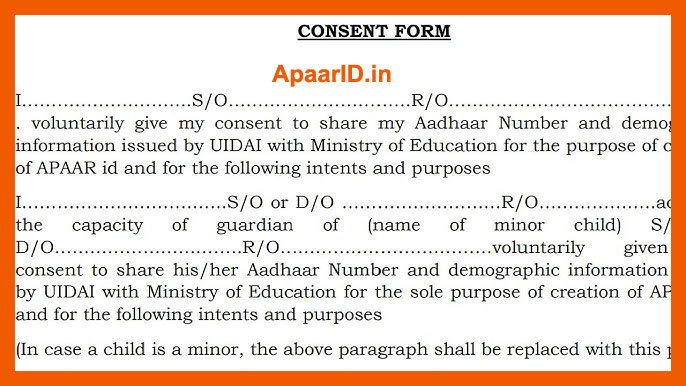The School Education Department has issued a directive addressed to the Commissioner of Education, making reference to a letter dated October 11 from the Union Ministry of Education, which was addressed to all chief secretaries. This correspondence pertains to the establishment of APAAR IDs for students.
Under the recently introduced ‘One Nation, One Student’ initiative by the Union government, the state government has mandated that all schools obtain parental consent to create a novel student identity card known as the Automated Permanent Academic Account Registry (APAAR).
These unique IDs will be assigned to each student, enabling the tracking of their educational progress, accomplishments, and other pertinent student information.
The School Education Department’s communication to the Commissioner of Education also highlights the Ministry of Education’s letter, emphasizing the need for separate parental consent to generate APAAR IDs based on students’ Aadhaar numbers. Furthermore, the state has instructed teachers to update students’ blood group, height, and weight details in the UDISE data.
The increasing volume of non-academic responsibilities has caused dissatisfaction among educators. In response, schools have been directed to conduct a special parent-teacher meeting from October 16 to 18 to raise awareness among parents about APAAR IDs and inform them of their purpose before seeking their consent.
The Ministry of Education has asked schools to get parents’ consent before creating new Automated Permanent Academic Account Registry (APAAR) ID cards for students. The APAAR ID card is a unique student ID that will be used to track students’ academic progress and achievements across the country.
Why is parental consent required?
The government has stated that parental consent is required because the APAAR ID card will contain sensitive personal information about students, such as their name, address, date of birth, and academic records. The government wants to ensure that parents are aware of the information that will be collected and how it will be used before they give their consent.
How to get parents’ consent
Schools can get parents’ consent by sending home a consent form that parents can sign and return. The consent form should explain what the APAAR ID card is and how the student’s information will be used. The form should also include a link to the APAAR ID card website so that parents can learn more about the program.
Benefits of the APAAR ID card
The APAAR ID card has a number of benefits for students, including:
- It will make it easier for students to transfer schools and apply for scholarships.
- It will help students to access educational resources and services online.
- It will help to track students’ academic progress and identify students who need additional support.
Concerns about the APAAR ID card
Some parents have expressed concerns about the APAAR ID card, including:
- They are worried about the privacy and security of their student’s personal information.
- They are not sure how the student’s information will be used.
- They are concerned that the APAAR ID card could be used to track students’ movements outside of school.
The government has addressed these concerns by stating that the APAAR ID card is a voluntary program and that parents can choose not to have their student participate. The government has also stated that the student’s information will be protected by strong security measures.
The APAAR ID card is a new initiative that could have a positive impact on students’ education. However, it is important for parents to understand the program and the benefits and risks before they give their consent.

resister nehe ho rahahe
Hi, You will get consent form from school itself and need to submit there.
School vale kh the hh ki previous school se apaar I’d number lekar aao…
We are not authorized to access student ID numbers from other schools. We recommend contacting the student’s previous school directly.